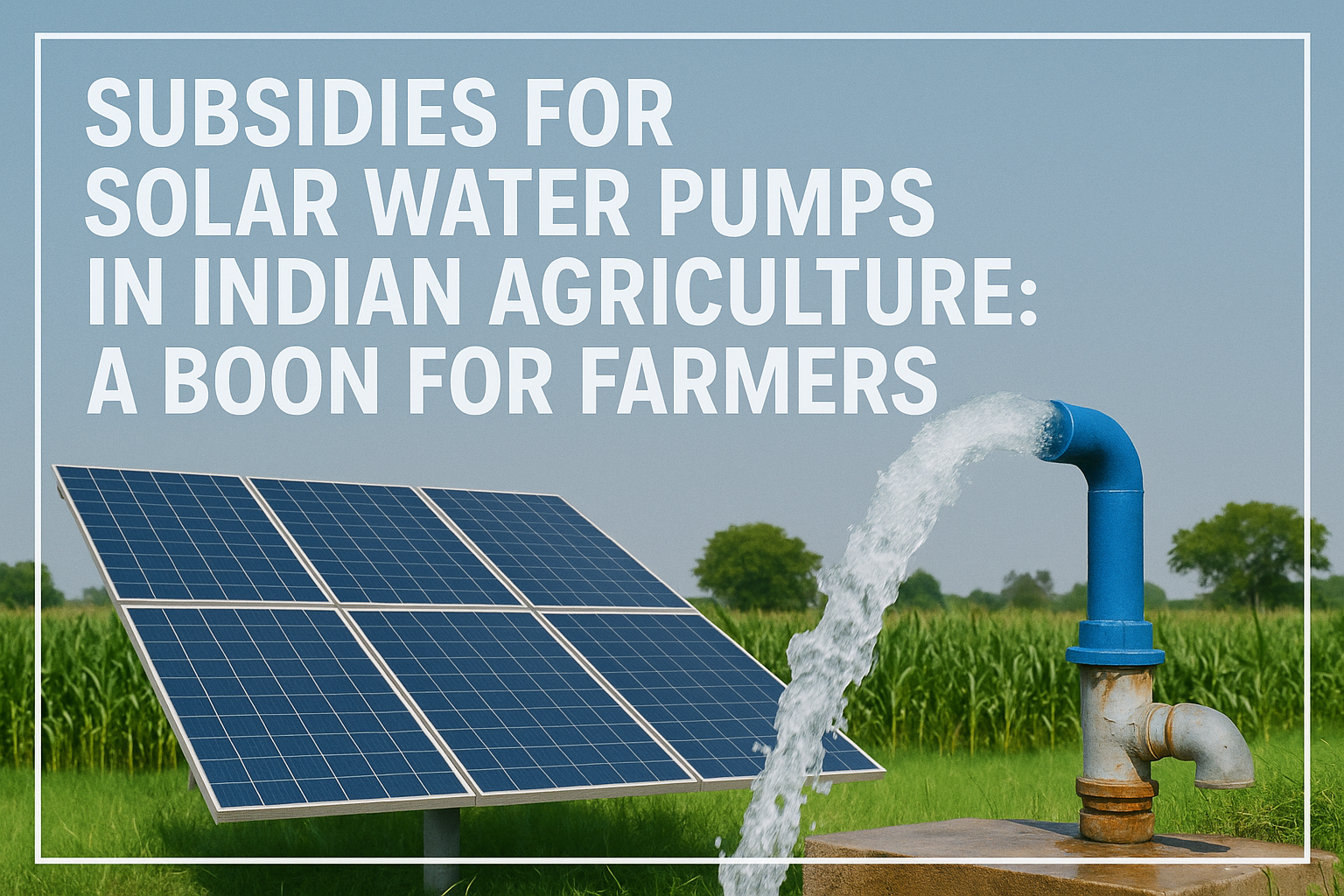
Subsidies for Solar Water Pumps in Indian Agriculture: A Boon for Farmers
Posted on November 18, 2025
India, an agricultural nation mainly, counts on agriculture for its food and labour supply. One of the difficulties the farmers face is the cost of and accessibility to irrigation, which has been the case for a long time, as they used to rely on pumps that consume diesel or electricity, both of which are costly and damaging to the environment. To resolve this, the state backs solar water pumps by giving subsidies, incentives, and concessional loans in the context of the PM-KUSUM scheme. These pumps assure the farmers of a reliable, cost-effective, and sustainable water supply for irrigation; thus, their economic independence through energy, a less expensive agricultural operation, and planting that withstands the changing climate.
What Are Solar Water Pumps?
A solar water pump is a machine that operates water pumping using solar energy from various sources, such as wells, ponds, or rivers, to irrigate lands. The pumps catch the sun’s rays and transform them into electric energy through PV (photovoltaic) panels, which are used the drive the pump. Solar water pumps are very effective, environmentally safe, and lower the reliance on traditional power sources such as electric and diesel.
Importance of Solar Water Pumps in Indian Agriculture
- Cost Savings: Farmers spend a significant portion of their income on diesel or electricity for irrigation. Solar water pumps operate on free solar energy, drastically reducing operational costs.
- Environmentally Friendly: By using renewable energy, solar pumps reduce carbon emissions and help combat climate change.
- Reliable Irrigation: Unlike electricity, which may be erratic in rural areas, solar energy ensures an uninterrupted water supply for crops.
- Boosts Crop Productivity: Regular and timely irrigation leads to better crop growth and higher yields.
Government Initiatives and Subsidies
Once solar-powered irrigation was recognised as an option, the Indian Government launched the programs through the Ministry of New and Renewable Energy (MNRE) and the associated farmers’ departments of the states. These steps are assisting farmers financially and providing them with subsidies to buy solar water pumps.
Key Schemes for Solar Water Pump Subsidies:
The government of India is promoting the adoption of solar water pumps as a sustainable method for agriculture. This mainly happens through the PM-KUSUM scheme launched in 2019. Small and marginal farmers are particularly the beneficiaries who can receive subsidies as high as 90% and also financial assistance for the installation of the solar power irrigation system, which will cut their irrigation cost by not only phasing out the use of electricity and diesel pumps but also eliminating the pumps.
How to Avail Solar Water Pump Subsidies?
There are several important steps that farmers in India must take if they wish to receive government subsidies for solar water pumps. First of all, they will need to confirm their eligibility, which means they should be registered farmers and have a landholding size that is in accordance with the scheme. After that, the next step is to go through the online application submission process, which is done via the official portals of either the state or the central government.
Once the application is submitted, the technical assessment stage is reached when the officials go to the site to evaluate whether it is suitable and feasible for the installation of the pump. Then, after getting the approval, the installation of the pump will be done, and the subsidy will be either paid upfront or as a reimbursement, thus giving the farmers access to an irrigation solution that is reliable, cost-effective, and environmentally friendly.
Benefits for Farmers
Solar water pumps offer several benefits to the farmers. The irrigational costs are reduced significantly, and as a result, the farmers can cut down 50 to 70% of the expenses for the energy that would have been consumed by diesel or electric pumps. The combination of money saving, as well as quick and efficient irrigation, leads to an increase in farm income, since the lower costs and more of the crops are the direct factors for the profit increase.
Besides, the farmers are granted the status of energy self-sufficient brands since they are no longer reliant on the unreliable power supply or the costly diesel. They are also practising eco-friendly agriculture by using solar-powered pumps because they are not only taking part in the green farming practices but also lessening their environmental impact.
Future of Solar Water Pumps in India
The Indian agricultural sector recognised the tremendous potential of solar water pumps as they would consume less energy and would be supported by the eco-friendly farming practices of the government-mandated PM-KUSUM scheme that is being implemented for millions of farmers.
The continuous development of solar technology and its price decrease not only make the pumps more dependable but also cheaper; their combination with smart farming techniques takes water-use efficiency and output to another level.
The use of solar pumps presents the farmer with a double-edged sword; i.e., the economic side, which includes reducing costs, and the environmental side, which involves reducing operations that generate greenhouse gases, such as diesel and electricity use, thus enabling farmers to create a climate-resilient agricultural system.
Conclusion:
The government, by providing subsidies on solar water pumps, is ushering in a new era in Indian agriculture. Not just financial support, but in a way, an investment in sustainable agriculture, energy independence, and nature conservation. Farmers switching over to solar for irrigation will not only save money but also become the producers of more and the cleansers of the earth. With continuous government support and technological progress, solar water pumping systems are expected to change India’s irrigation landscape and secure a prosperous future for farmers and the country.
